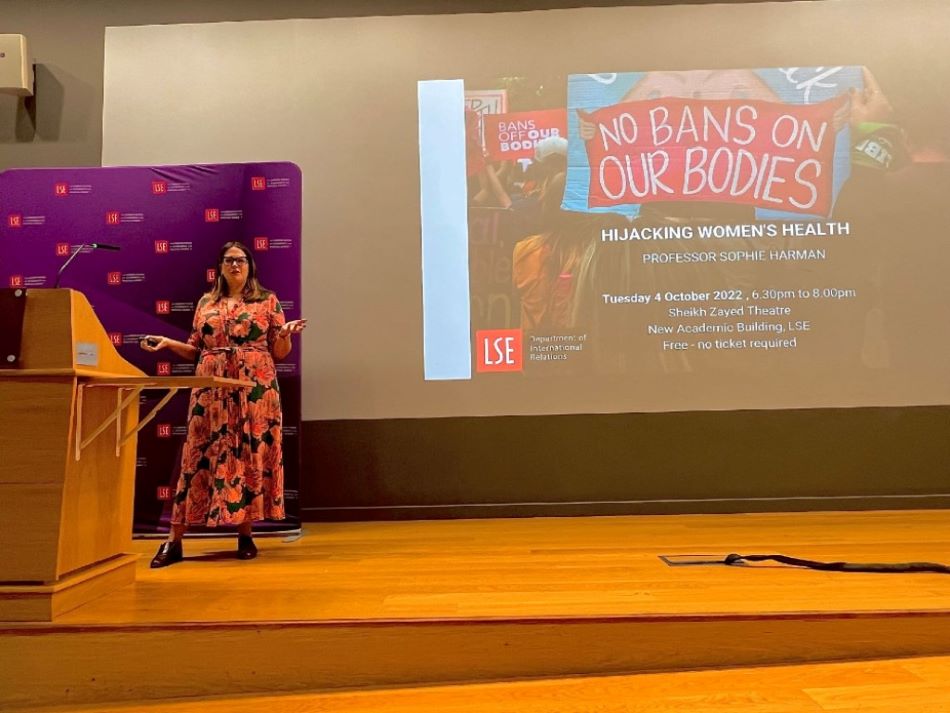Pauline El-Khoury, IPE MSc Student, and Thomas Da Costa Vieira, LSE Fellow in International Political Economy, argue that despite the recent enactment of gender policies that appear to be feminist and progressive, the Macron government pursues an authoritarian and neoliberal agenda which instrumentalises, undercuts and represses true feminist aspirations – both at home and abroad.

On 4 March, 2024, France made history by becoming the world’s first country to enshrine the right to abortion in its Constitution. President Emmanuel Macron celebrated this milestone as a significant advancement for women’s rights, declaring that his government will “lead this fight on our continent where reactionary forces first and always attack women’s rights before targeting the rights of minorities, of all the oppressed, and all freedoms.”
While this move is symbolically powerful, it raises questions about its practical effectiveness. Despite constitutional protection, deeper issues within the national healthcare system, exacerbated by neoliberal policies of privatisation, remain unaddressed. A study by Le Monde reported that nearly 8% of abortion centres in France closed over the past five years due to healthcare liberalisation. Additionally, a 2023 study found that nearly 20% of women seeking abortions had to travel outside their home departments, highlighting inadequate local services. By constitutionalising abortion rights, Macron secured a favourable legacy but left these pressing access and equity issues unanswered.
By constitutionalising abortion rights, Macron secured a favourable legacy but left these pressing access and equity issues unanswered.
This paradox prompts an examination of Macron’s ‘gender-just’ reforms within a broader context, where states adopt neoliberal policies under the guise of feminist initiatives. As Prügl (2017) argues, this phenomenon is illustrated by the World Bank’s emphasis on gender equality programmes, which “continues to use the market as the arbiter of social values while providing openings for feminist agendas”. This neoliberalisation of feminism operates in two main ways: first, by involving more women in neoliberal economic projects, and second, by promoting feminist ideas that facilitate the commodification of new aspects of life. Consequently, integrating gender into neoliberal governance may not fundamentally alter the market’s dominant influence on policy priorities – encouraging scrutiny of Macron’s true feminist intentions both at the national and international levels.
Authoritarian neoliberalism at home
In recent years, the Macron government has increasingly adopted a form of ‘authoritarian neoliberal’ governance which seeks to impose neoliberal policies through undemocratic decision-making processes and repression of popular movements and voices. And despite the government’s professed feminism, this authoritarian neoliberalism has increasingly extended to the realm of gender politics and the sphere of social reproduction. For instance, amid riots in urban areas – stemming from economic stagnation and Nahel Merzouk’s murder by policemen – the government announced a proposal to financially penalise parents of minors involved in riots and criminal acts.
This measure shifts responsibility from the state to individuals, disproportionately affecting women and families in precarious situations. Justice Minister Éric Dupond-Moretti’s assertion that parents could face imprisonment and hefty fines frames the issue as one of parental failure, oversimplifying complex social issues and criminalising poverty. From a feminist perspective, this policy exacerbates the marginalisation of single mothers and low-income families, who often bear the brunt of socio economic hardships – reinforcing neoliberal ideals of individual responsibility over collective welfare.
By threatening financial sanctions against feminist groups, the government effectively censors dissenting voices, controlling the narrative around feminist issues to align with its political agenda.
Similarly, the recent proposal by Minister Aurore Bergé to scrutinise and potentially cut funding for feminist associations based on their statements about the 7 October attacks on Israel combines stringent state control with neoliberal economic policies, undermining genuine feminist advocacy. By threatening financial sanctions against feminist groups, the government effectively censors dissenting voices, controlling the narrative around feminist issues to align with its political agenda. This tactic shifts the burden of maintaining advocacy and support services onto the organisations themselves. Further, it reinforces a neoliberal agenda that minimises state intervention in social welfare while silencing opposition to the government’s views.
Neoliberal feminist policy abroad
Internationally, Macron’s “Feminist Foreign Diplomacy” programme positions France among one of the few countries adopting a Feminist Foreign Policy (FFP) in the world. In 2018, France launched the ‘International Strategy for Equality Between Men and Women 2018-2022’, branding it as a central force behind France’s diplomatic and external action. This programme prioritises economic resources for feminist networks, the economic empowerment of women, and increasing their political participation abroad. French officials emphasise that France is the first UN Security Council member to formally adopt an FFP and establish a system to track its progress.
However, this top-down approach to FFP perpetuates global hierarchies that exclude non-normative and non-hegemonic bodies, ideas, and knowledge. By setting standards for organisations to qualify for funding, France creates administrative dependency and a form of shadow governance over underdeveloped countries. This policy embeds gender equality into neoliberal frameworks, prioritising market-friendly solutions that do not address deeper systemic issues. As explained in the Gender and Development Network’s report, focusing primarily on distributive roles in FFPs creates financial dependencies, which contradicts feminist principles of autonomy and self-determination. It limits the capacity of local feminist movements to define and pursue their own agendas without being reliable on foreign interference.
Macron’s feminist foreign policy does not transform gender relations but rather uses feminist rhetoric to maintain existing power structures.
By leveraging feminist language, Macron brands France as a leader in gender equality, enhancing its global reputation. However, there is no agreed-upon definition of the criteria FPPs should meet, and France has yet to develop its own framework with clear objectives, a scope of action, or specific criteria. For example, unlike Sweden or Canada, France does not include trade policy within its feminist policy scope. The High Council report highlighted that only 20% of the EU’s trade agreements, which significantly influence France’s trade policy, mention women’s rights. Moreover, the concept of intersectionality, which scholars emphasise as crucial for addressing the diverse needs of women, is notably absent from France’s policy discussions. This lack of clarity demonstrates that Macron’s feminist foreign policy does not transform gender relations but rather uses feminist rhetoric to maintain existing power structures.
These policies are feminist in the sense that they signal awareness of particular gender inequalities. They are neoliberal in the sense that they disavow social structures that produce this inequality and accept full responsibility for individual success and well-being.
Overall, feminist scholars have analysed how feminism itself has changed through its engagement with neoliberal policies. These policies are feminist in the sense that they signal awareness of particular gender inequalities. They are neoliberal in the sense that they disavow social structures that produce this inequality and impose full responsibility on individuals for their success and well-being. Claims that are in line with the market agenda (such as women’s employment) are granted primacy, and gender equality is increasingly represented as a contribution to economic growth and competitiveness. In this context, the fight for genuine gender equality must confront the uncomfortable truth: neoliberal feminist policies serve the market and governments more than it serves women.
the fight for genuine gender equality must confront the uncomfortable truth: neoliberal feminist policies serve the market and governments more than it serves women.
This article represents the views of the authors, and not the position of the Department of International Relations, nor of the London School of Economics.
Banner photo, Creative Commons CC0 1.0 Universal.





